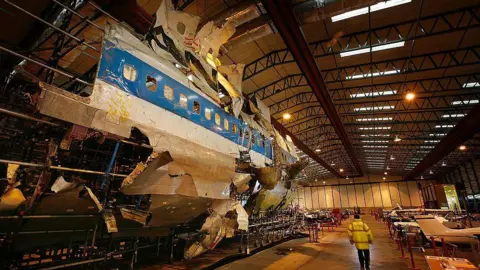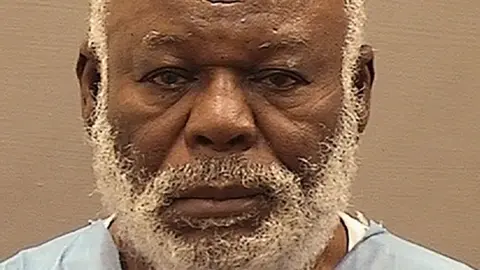Lockerbie wreckage moved to US for bombing trial
 Getty Images
Getty ImagesA section of the American airliner which exploded over Lockerbie 35 years ago is being transported to the US for the trial of the man accused of making the bomb.
The wreckage from the fuselage of Pan Am Flight 103 will form part of the evidence in the case against Abu Agila Masud.
The Libyan has denied making the bomb which destroyed the plane on 21 December 1988.
Relatives of the 270 victims have been informed of the transfer of the fuselage section, which is part of a formal evidence sharing process between Scottish and American prosecutors.
The Boeing 747 Clipper Maid of the Seas broke up at 31,000 ft as it flew from Heathrow to New York.
All 259 passengers and crew on board were killed, along with 11 people in Lockerbie who died when the plane fell on their homes.
 Reuters
ReutersThe victims included 190 American citizens. It was the worst terror attack against the US until 9/11.
Approximately 319 tons of wreckage from the plane were scattered over 845 square miles.
Air accident investigators reassembled a 65ft long section of the fuselage, showing the "petalling" caused by the explosion.
The bomb had been concealed in a radio cassette player in a suitcase in the hold.
Abu Agila Masud has been accused of making the device and is due to stand trial at a federal court in Washington next May.
The US authorities have accused him of causing the destruction of an aircraft resulting in death.
Laura Buchan leads the team of prosecutors working on the case at the Crown Office and Procurator Fiscal Service.
"The transfer of physical items of evidence from Scotland into US custody is beginning," she said.
"The transfer includes parts of the fuselage of Pan Am 103 which are a production in the criminal investigation.
"We understand that the fuselage will hold significance for many of the families of those who lost their lives and they have been informed of the transfer plans."
In 2001, three Scottish judges ruled that Libyan intelligence agent Abdelbasset Al-Megrahi had played a key role in the bombing and convicted him of the murder of 270 people.
Megrahi was jailed for life but freed on compassionate grounds by the Scottish government while terminally ill with cancer in 2009.
He had always protested his innocence and died in Libya three years later.
 Alexandria Sheriff's Office
Alexandria Sheriff's OfficeScotland's Lord Advocate Dorothy Bain KC said the verdict from the first Lockerbie trial had been the subject of intense scrutiny and had been upheld twice in the appeal court.
She described the transfer of the fuselage section as "a strong expression of the commitment that Scottish prosecutors and officers of Police Scotland have to bringing all those responsible for this terrible act to justice".
That message was echoed by Police Scotland chief constable Jo Farrell, whose officers have been involved in building the case against Masud.
She said the force would pursue those involved in bombing the plane "no matter the passage of time".
